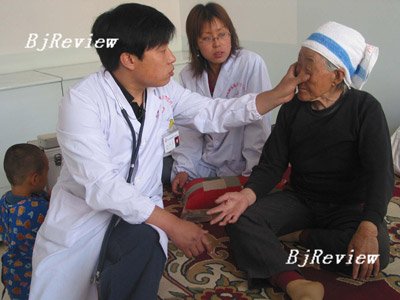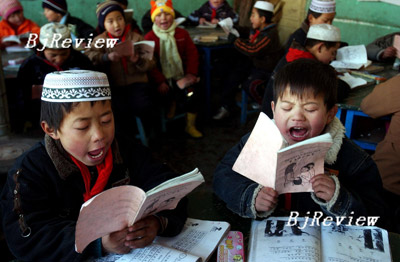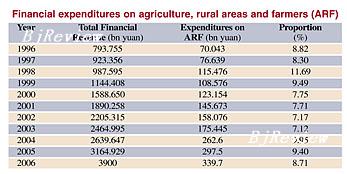
Minister of Finance Jin Renqing, the decision-maker of China's finance expenditure, recently stated the ministry's new year resolution.
"The majority of the newly added government investment in 2007 will be used in rural construction," said Jin. "We will make sure that the scale and proportion of investment used in rural construction will increase compared with those in 2006."
In 2006, the major capital expenditure of the Ministry of Finance involved the following items: expenditures for capital construction; additional appropriation for enterprises' circulating capital; innovation funds, and science and technology promotion funds; geological prospecting expenses; operating expenses of industry, transportation and commerce; expenditures for supporting agricultural production and agriculture operating expenses; operating expenses for culture, education, science and health care; pension and relief funds for social welfare; expenditures for national defense; expenditures for government administration; and expenditures for price subsidies.
But this year, the expenditure items will change. According to the new budget statement, some items listed in 2006 have disappeared, like expenditures for capital construction and expenditures for government administration. Instead, they are replaced by expenditures for general public services and transportation. Meanwhile, some new items are added like expenditures for urban and rural community affairs, environmental protection and social insurance.
Favoring rural areas

"In 2007, the whole country will carry out reform on the guarantee mechanism for expenditures on universalizing compulsory education in rural areas," said Jin.
According to the Ministry of Finance arrangement, free compulsory education will be universalized in central and eastern China's rural areas this year. As a result, tuition and incidental fees will be exempted for the entire 148 million middle and primary school students in all rural areas, and the funds needed will be brought under the umbrella of the state budget.
Jin said beginning in the spring semester of 2006, free compulsory education has already been fully carried out in the western part of the country. Boarding school students also receive subsidies for living expenses from the government. A total of 48.8 million students have benefited from the project, which saves 140 yuan for each primary school student and 180 yuan for every middle school student per year.
The Central Government plans to spend 24 billion yuan on the rural free compulsory education project this year, compared to 19.1 billion yuan last year.
In terms of the new-type rural cooperative medical system, Zhang Tong, spokesman for the Ministry of Finance, noted that it has achieved some effects and will be extended to 80 percent of the towns and cities nationwide this year. To achieve this goal, 14 billion yuan is required.
According to the requirement of the Central Government, beginning in 2007, the minimum living standards guarantee system should be established in all rural areas. The state treasury should grant support to the establishment and improvement of this system.
In fact, the Central Government has constantly strengthened its support for the development of rural social undertakings. Last year, among the Central Government's budgeted investment and the treasury bond investment, 53 billion yuan was devoted to agriculture and rural construction, accounting for 45.74 percent of the total investment scale. In 2006, the state budget related to agriculture, rural areas and farmers was 339.7 billion yuan, up 14.2 percent on 2005.
"The practice of inclining the financial expenditure to rural areas has been a major trend over the past two years and will continue for quite a long time in the future," said Chen Xiwen, Director of the Office of the Central Rural Work Leading Group. "It will not only facilitate the development of modern agriculture, but also help narrow the gap between urban and rural areas."
People-oriented

In addition to giving priority to rural construction, the Ministry of Finance will attach equal importance to science, education, culture, public health, social security, resource conservation, ecological construction and environmental protection.
For a long time, the structure of China's financial expenditure mainly featured government investment on economic construction and administrative management expenditure. As a result, the construction of the public finance system, which provides public service products, has lagged behind. It leads to an embarrassing situation: In spite of rapid economic development, the inefficient and insufficient public service goods plague citizens relating to problems in education and medicare. The 2007 budget will better address problems relating to people's livelihood and public service programs.
Jin Renqing pointed out that it is imperative that the vast majority of people enjoy the achievement brought about by reform and development, as well as the patronage of public finance.
Jin also stated that this year, more urban employees will enjoy the benefits of the basic medical treatment insurance system. Support will be granted to retired workers from bankrupt enterprises or businesses with financial problems to join the system. More aid will be given to urban and rural medical treatment. Central finance will also be committed to improve the pension insurance system for urban employees. Public interest-oriented cultural undertakings and the cultural industry will be developed at a faster speed. The government will intensify its effort to improve the reemployment and social security work. The distribution system will be further rectified.
Zhang Tong said this year the central budget will make breakthroughs in education, public health and the social security system.
In terms of education, in addition to carrying out free compulsory education in rural areas, the central budget will also support the universalization of compulsory education in rural areas. Children from poverty-stricken urban families and those of migrant workers will receive support from the central budget. The establishment of a stipend and low-interest loan system for senior middle school, university and vocational school students will be put under deliberation. The system aims to let children from poor families finish their education through the support of the government.
In 2007, the proportion of expenditure on education will be raised to 4 percent of the GDP. The public education resources will lean toward rural areas, the country's central and western parts, poverty-stricken areas, border areas and minority regions, in an effort to promote the coordinated development of public education.

With regard to health care, the government will devote more efforts to building community hospitals in urban areas and deploy special funds to community public health, so that urban residents can enjoy basic public health services in their own communities.
"Finance departments should put those policies in place and help solve problems related to the access to and high cost of medicare," said Zhang.
In 2007, the free treatment of infectious diseases should be expanded, Zhang said. The basic medicare insurance program will further expand its coverage rate, and more efforts will be made to guarantee food and drug security.
In terms of social security, both the pension and the aid for needy people will be raised. Moreover, the government will promote a series of employment training and employment-related services.
The government's support for public services wins applause from experts. Economic professor Lin Shuanglin from Tsinghua University noted that the urgent task now is to narrow the gap between the rich and the poor, and the most efficient way is to provide more public facilities for the poor. Those facilities, in effect, will help reduce the living costs of the needy, which will indirectly raise their incomes.
Expenditure growth slowed down
The State Information Center estimates that in 2007 the growth of both fiscal revenue and fiscal expenditure will be lower than those of 2006. It is estimated that the fiscal expenditure growth will be about 14 percent in 2007. In 2006, the growth of fiscal revenue and fiscal expenditure was 24 percent and 16.9 percent respectively.
It is reported that due to the government's control over investment speed, the growth of infrastructure construction slowed down in 2006. From January to October, expenditures on infrastructure construction increased by 12.2 percent, 3.8 percentage points lower than that of 2005. This trend will continue in 2007.
Expenditures on culture, education, science and public health will grow steadily. From January to October 2006, expenditures in those sectors hit 495.42 billion yuan, up 15.1 percent compared with the same period of the previous year. This year, the amount will continue to increase to some extent.
In the first 10 months of 2006, national defense expenditures increased 14.2 percent, 0.3 percentage points lower than the same period in 2005. The administrative management fees grew by 14.3 percent, 1.6 percentage points lower. Expenditures on the aforementioned two items won't experience major changes in 2007.
Rural and agricultural development is expected to see the largest growth in financial expenditure this year.
"But, as the expenditure won't take an overly large proportion of fiscal revenue, it will not hike the overall budget," said Lin.
| 